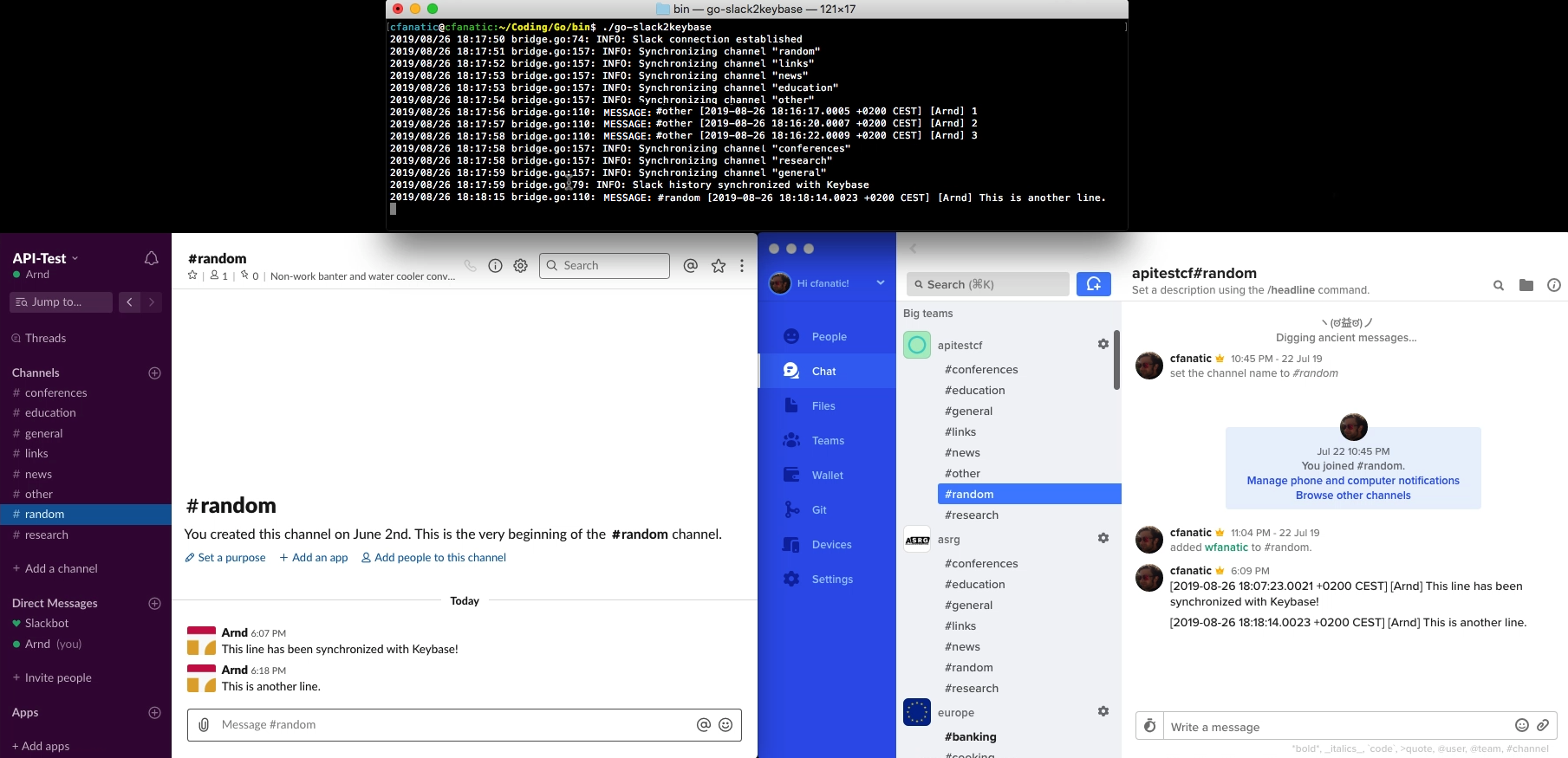Use this tool to forward chat messages from Slack to Keybase. For those who hate Slack, but love Keybase.
Deploy it on your desktop or server:
Whenever started, your Keybase team will be automatically synchronized with your Slack workspace.
Developed and tested on the following setup:
- macOS 10.13.6
- Go 1.12.7
- Slack 4.0.0
- Keybase 4.2.0
You need to set up Slack and Keybase, before you can run the bridge:
-
Log on https://api.slack.com and create an app for your Slack workspace
-
Under Features → Bot Users, define a display and user name for the bot
-
Under Features → OAuth & Permissions, select the following permission scopes:
Access user’s public channels Add a bot user with the username @<your_bot_name> -
Go to Settings → Basic Information and install the app to your workspace
-
Open Slack and add your app into all channels of your workspace
-
Open Keybase and create a team which has the same name as the Slack workspace
-
Add channels to your team in Keybase according to the ones in your Slack workspace
Remember the OAuth Access Token and the Bot User OAuth Access Token information.
View the package documentation on how to implement the bridge:
go doc -all github.com/cfanatic/go-slack2keybase/bridge
Clone the bridge on your desktop:
go get github.com/cfanatic/go-slack2keybase
Enter the correct OAuth information in main.go:
const oauth_user = "<INSERT_USER_TOKEN>"
const oauth_bot = "<INSERT_BOT_TOKEN>"Build and install the repository:
go install github.com/cfanatic/go-slack2keybase
Run the bridge by calling:
go-slack2keybase
Upon successfull installation, you will see output similar to the following screenshot:
Clone the Keybase command line client on your server:
go get github.com/keybase/client/go/keybase
Modify keybase/client/go/service/main.go to call the bridge before the listen loop:
// At this point initialization is complete, and we're about to start the
// listen loop. This is the natural point to report "startup successful" to
// the supervisor (currently just systemd on Linux). This isn't necessary
// for correctness, but it allows commands like "systemctl start keybase.service"
// to report startup errors to the terminal, by delaying their return
// until they get this notification (Type=notify, in systemd lingo).
systemd.NotifyStartupFinished()
const oauth_user = "<INSERT_USER_TOKEN>"
const oauth_bot = "<INSERT_BOT_TOKEN>"
bridge := bridge.New(oauth_user, oauth_bot, true)
bridge.Start()
defer bridge.Stop()
d.G().ExitCode, err = d.ListenLoopWithStopper(l)
return errBuild and install the repository:
go install -tags production github.com/keybase/client/go/keybase
Run the bridge by calling:
keybase service
Upon successfull installation, you will see output similar to the following log:
server@cfanatic:~/go/bin$ ./keybase service
▶ INFO | net.Listen on unix:/run/user/1000/keybase/keybased.sock
2019/08/27 10:24:57 bridge.go:74: INFO: Slack connection established
2019/08/27 10:24:57 bridge.go:157: INFO: Synchronizing channel "links"
2019/08/27 10:24:58 bridge.go:157: INFO: Synchronizing channel "news"
2019/08/27 10:24:58 bridge.go:157: INFO: Synchronizing channel "education"
2019/08/27 10:24:59 bridge.go:157: INFO: Synchronizing channel "other"
2019/08/27 10:24:59 bridge.go:157: INFO: Synchronizing channel "conferences"
2019/08/27 10:24:59 bridge.go:157: INFO: Synchronizing channel "research"
2019/08/27 10:25:00 bridge.go:157: INFO: Synchronizing channel "general"
2019/08/27 10:25:00 bridge.go:157: INFO: Synchronizing channel "random"
2019/08/27 10:25:02 bridge.go:110: MESSAGE: #random [2019-08-27 10:24:52.0002 +0200 CEST] [Arnd] Test 1-2-3
server@cfanatic:~/go/bin$
This video demonstrates the general usage and features.
